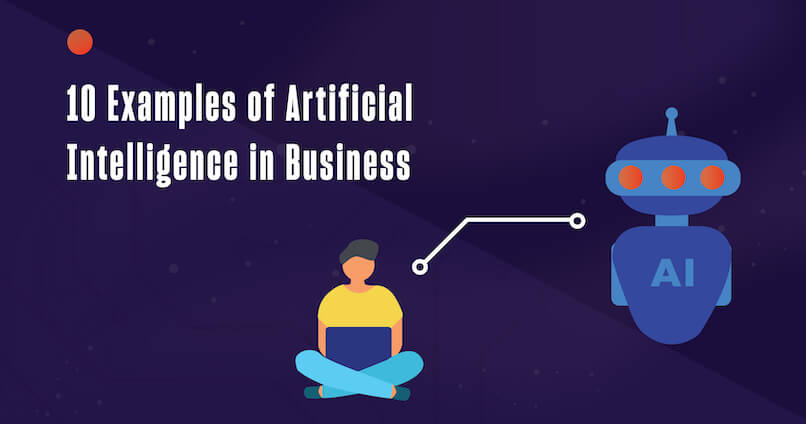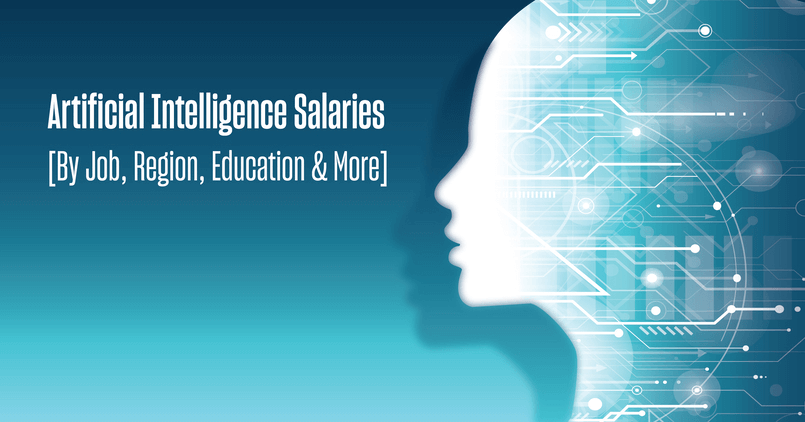Artificial intelligence (AI) is still a mysterious concept to many, but one thing is certain — the field of AI is rich with career opportunities. Based on 74% annual growth and demand across nearly all industries, LinkedIn recently named artificial intelligence specialist as a top emerging job — with data scientist ranking #3 and data engineer #8.
Salaries for artificial intelligence engineers are typically well above $100,000 — with some positions even topping $400,000 — and in most cases, employers are looking for master’s degree-educated candidates. Read on for a comprehensive look at the current state of the AI employment landscape and tips for securing an AI Engineer position.
What Is AI?
First, let’s explore the basic definition. Artificial intelligence, which is also known as machine intelligence, is a branch of computer science that aims to imbue software with the ability to analyze its environment using either predetermined rules and search algorithms or pattern recognizing machine learning models, and then make decisions based on those analyses. In this way, AI attempts to mimic biological intelligence to allow the software application or system to act with varying degrees of autonomy, thereby reducing manual human intervention for a wide range of functions.
Here are a few other definitions from reputable sources in the artificial intelligence field:
IBM: “At its simplest form, artificial intelligence is a field, which combines computer science and robust datasets, to enable problem-solving. It also encompasses sub-fields of machine learning and deep learning, which are frequently mentioned in conjunction with artificial intelligence. These disciplines are comprised of AI algorithms which seek to create expert systems which make predictions or classifications based on input data.”
Forbes also provides a list of definitions and explains that AI dates back to 1956 when John McCarthy first coined the phrase.
What Does an AI Engineer Do?
Artificial intelligence and machine learning engineers work on a variety of projects. The exact responsibilities will depend on the company, industry, the specific role and other factors, but according to SuperDataScience, the main duties of an AI engineer typically include:
- Computer programming, using languages such as Java, Python or C++
- Working with data, statistics and algorithms
- Using data modeling and evaluation strategies
- Applying machine learning algorithms and libraries
- Research and design deep learning applications
In general, the report says, the role of an AI engineer can be broken down into four categories:
- AI or Machine Learning Researcher
This role involves exploring the theoretical side of AI, and looking to further the development of the technology or apply it to new areas. - AI Software Developer or Program Manager
These engineers apply machine learning to a given data set. Strong programming and mathematical skills are needed for this role. - Data Analysis and Data Mining Engineers
This position uses modeling and creating deep-learning systems to recognize and respond to patterns. - Machine Learning Engineers
This covers everything else AI-related; for example, using and applying AI techniques to perform functions or solve problems in a business setting.
Why AI Engineers Are in Demand
Artificial intelligence positions were in demand before COVID-19, but now there’s even more of a surge. Why? “The COVID-19 crisis has created a great deal of uncertainty in the job market, with one of the largest — and hopefully temporary — unemployment spikes ever seen in the modern economy,” according to RTInsights. “One thing is certain, however — artificial intelligence and digitization are driving the growth of new careers. The recent crisis — which has pushed just about every company into digital transformation and virtual workspaces — has only increased demand for AI skills.”
A recent report from Gartner shows that the strongest demand for skilled professionals specialized in AI isn’t from the IT department, but from other business units within a company or organization.
In a press release highlighting the report, Peter Krensky, research director at Gartner, explains that “high demand and tight labor markets have made candidates with AI skills highly competitive, but hiring techniques and strategies have not kept up.”
Job Responsibilities for an AI Engineer
As mentioned earlier, job responsibilities will always vary based on the specific position. Technology training and certification provider Simplilearn reports that, generally speaking, common job responsibilities for an AI engineer include:
- Convert machine learning models into application program interfaces so that other applications can use them
- Build AI models from scratch and help others in the organization understand what results they gain from the model
- Build data ingestion and data transformation infrastructure
- Automate infrastructure that the data science team uses
- Perform statistical analysis and tune the results so the organization can make better-informed decisions
- Set up and manage AI development and product infrastructure
- Be a good team player
Skills Needed to Be an AI Engineer
So, now that we’ve detailed the responsibilities of an AI engineer, let’s discuss the hard and soft skills usually required in most positions. It’s important to note, however, that the skills needed may vary depending on the specific job and industry, but according to Simplilearn, AI engineers must typically be proficient in the following:
- Linear algebra, probability and statistics. This will help with understanding how to implement different AI models, including Naive Bayes, Gaussian mixture models and Hidden Markov models.
- Apache Spark and big data technologies. Since AI engineers work with a lot of data, they need to understand Apache Spark and other technologies in order to analyze the information. Other technologies may include Cassandra and Hadoop.
- Algorithms and frameworks. Understanding algorithms — such as KNN, Support Vector Machine and linear regression — will allow you to better understand ML models. “Additionally, to build AI models with unstructured data, you should understand deep learning algorithms (like a convolutional neural network, recurrent neural network, and generative adversarial network) and implement them using a framework,” according to Simplilearn. “Some of the frameworks used in artificial intelligence are PyTorch, Theano, TensorFlow, and Caffe.”
edureka! echoes the previously mentioned skills but also adds language, video and audio processing, neural network architectures and communication. According to SuperDataScience, AI theory and techniques, natural language processing and deep-learning, data science applications and computer vision are also important in AI engineer roles.
When it comes to soft skills, popular job site Indeed offers up a list of the most sought-after and important ones, including:
- Problem-solving
- Effective communication skills
- Self-direction
- Drive
- Flexibility
- Teamwork
- Dependability
- Conflict resolution
- Leadership
Other important soft skills include:
- Analytical thinking
- Patience and resilience
- Working independently or as part of a team
- Attention to detail
- Focus
- Willingness to learn new skills and acquire new knowledge
As Indeed explains, “soft skills are often transferable across careers and industries. As a result, you may find that you possess many of the required traits even if you don’t match the exact profile in a job description. As you search for jobs, pay special attention to posts calling for candidates with soft skills or traits you possess.”
Download Our Comprehensive Checklist for Choosing the Right AI Degree Program
Top Programming Languages for AI Engineers
Programming languages are an essential part of any AI job, and an AI engineer is no exception; in most AI job descriptions, programming proficiency is required.
The platform Analytics Insight lists the best programming languages for artificial intelligence:
- Python, which is considered “the ideal coding language used for machine learning, NLP and neural network connections.”
- Prolog, otherwise known as logical programming, is considered one of the oldest programming languages
- LISP, or list processing, “is flexible and adapts to the solution and can be effectively used for machine learning. LISP is known for rapid prototyping and the dynamic creation of new objects.”
- Java, one of the most popular programming languages, has a variety of open-source libraries. “Java is user-friendly and provides an independent platform and hence is considered good for developing AI.”
- C++ can be used to build neural networks; its speed is its largest advantage.
Other top programming languages for AI include R, Haskell and Julia, according to Towards Data Science.
Education Requirements for an AI Engineer
If you’re looking to become an artificial intelligence engineer, a master’s degree is highly recommended, and in some positions, required.
Advanced education will help you achieve a deeper understanding of AI concepts, topics and theories. It’s also a valuable way to gain first-hand experience and meet other professionals in the industry. All of this can translate to helping you gain an important advantage in the job market and often a higher salary.
According to Datamation, “35% of AI positions require a Ph.D. and 26% require a master’s degree. Why? Because AI is a rapidly growing field and when you study at the Ph.D. level and participate in academic projects, they tend to be cutting edge if not bleeding edge, and that gives the student the experience they need for the work environment.”
AI Engineer Salary by Job Title
Here are some of the most common job titles you’ll find associated with AI engineering. Please note — salaries are dynamic and often change daily or weekly due to market trends and demand. The numbers listed below were the most recent at the time of this report.
| Job Title | Average Salary |
| AI Engineer | $98,340 |
| AI Software Engineer | $139,952 |
| Algorithm Engineer | $130,585 |
| AI Platform Engineer | $133,618 |
| AI Developer | $103,724 |
How to Move Up the AI Engineer Ranks
In terms of education, you first need to possess a bachelor’s degree, preferably in IT, computer science, statistics, data science, finance, etc., according to Codersera. Prerequisites also typically include a master’s degree and appropriate certifications.
In order to move up the ranks, Codersera explains that aspiring engineers should familiarize themselves with the following:
- Software development lifecycle
- Modularity, OOPS, classes
- Design patterns
- Statistics and mathematics
- Machine learning
- Deep learning and neural networks
- Electronics, robotics and instrumentation
Proficiency in programming languages, business skills and non-technical skills are also important to working your way up the AI engineer ladder.
Companies Hiring AI Engineers
A recent LinkedIn search for “artificial intelligence engineer” resulted in thousands of postings, including for the following notable companies and organizations:
- Adobe
- Amazon Web Services
- Apple
- CarMax
- Carnegie Mellon University
- Dana-Farber Cancer Institute
- Dropbox
- Etsy
- Fidelity Investments
- Glassdoor
- IKEA
- JPMorgan Chase & Co.
- Major League Baseball
- Target
- TikTok
- Vanguard
- Zoom
And the list goes on. In other words, artificial intelligence engineering jobs are everywhere — and, as you can see, found across nearly every industry.
AI Career Outlook
The job outlook for careers in artificial intelligence is, as ZipRecruiter puts it in a recent article, “excellent” and is “expected to grow explosively as it becomes capable of accomplishing more tasks.”
The U.S. Bureau of Labor Statistics projects computer and information technology positions to grow much faster than the average for all other occupations between 2022 and 2032 with approximately 377,500 openings per year.
A master’s degree will put you in an even better position by giving you an edge over the competition and adding the real-world experience and knowledge that many companies and organizations are looking for in top AI engineering candidates.
Accelerate Your AI Engineer Career with a Master’s Degree from USD
If you’re looking for an exciting degree program that will position you for success as an artificial intelligence engineer, look no further than the University of San Diego.
USD offers a 100% online master’s degree in Applied Artificial Intelligence, which is ideally suited to those with a background in science, mathematics, engineering, health care, statistics or technology. But the program is also structured to train those from other backgrounds who are motivated to transition into the ever-expanding world of artificial intelligence.
Please visit our degree program page for more information.




![Preview image of How Artificial Intelligence Is Used in Finance [+ 15 Examples]](https://onlinedegrees.sandiego.edu/wp-content/uploads/2022/01/USD_15-Examples-of-Artificial-Intelligence-in-Finance-1.jpg)

